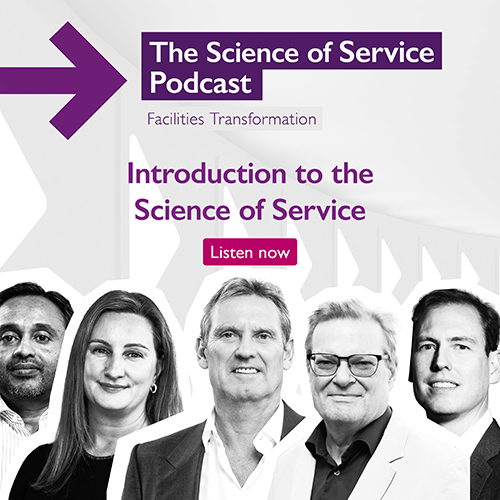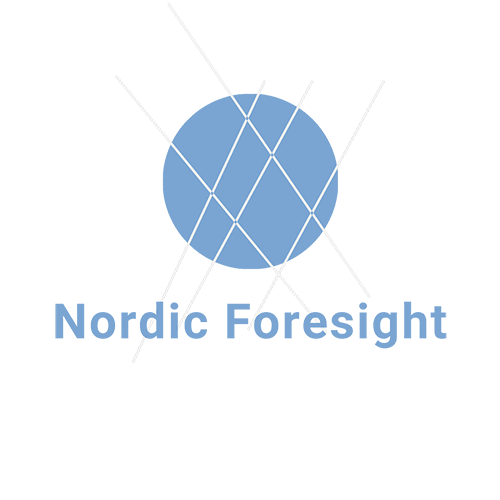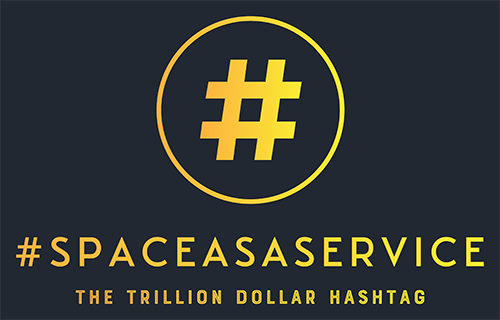The Science of Service Podcast: Invitation to a brave new world

By Ian Ellison, Workplace Geeks
Listen to episode one now: An Introduction to the Science of Service
Back in the 1990s, chess grandmaster, Garry Kasparov, faced IBM’s Deep Blue computer. It was the classic battle of strategic skill. But with a twist. This time, the contest was between man and machine. In 1996, Kasparov scraped victory. But in 1997, the outcome was different. Deep Blue won, four games to two. Chess fans around the globe were stunned. But perhaps not as much as Kasparov himself. The result showed the rising power of machines.
Discovering facilities transformation
Fast forward to 2024. Technology touches every aspect of our lives, often without us even knowing. Which brings me to the first episode of our brand-new podcast with Mitie, hosted by yours truly, Ian Ellison, and my Workplace Geeks co-host, Chris Moriarty. We were invited to The Shard in London to meet the leadership team of the UK’s largest facilities management company. Our mission? To learn more about Mitie’s Science of Service and facilities transformation. In truth, we wondered if this was evidence of a new era of technology-driven facilities management? Or was it just fancy branding?
During our first meeting, Mitie’s CEO, Phil Bentley, outlined the company’s strategic progress during his tenure, which first developed from ‘Beyond FM’ to ‘The Connected Workspace’. This has helped shift the business from managing facilities to becoming a strategic organisational partner. Now, Mitie is turning its attention to ‘facilities transformation’. And their vehicle is a tech-enabled, digital-first approach, epitomised by the Science of Service.
A multi-million pound investment
Phil also revealed Mitie has ringfenced £145m to invest in new technological infrastructure for their service revolution. Mitie’s CTO, Cijo Joseph, added that you can think of it as the ‘digital plumbing’ to enable the Science of Service. “Wow,” we thought. A significant investment. Especially for facilities management – a sector traditionally plagued by a cost reduction and lack of research and development.
So, what exactly is the Science of Service? And what does it look and feel like to Mitie customers? Phil invited Chris and I to go on a voyage of discovery to find out.
We’ve spent months learning from organisations including Eurostar, Essex County Council, Lloyds Banking Group, Royal London and The Shard Quarter. Plus, we’ve looked at delivery from several different angles. We’ve explored carbon reduction, risk management and cybersecurity, proptech, workplace experience and clinical hygiene. And along the way, we’ve also interviewed countless Mitie and industry experts.
Efficiency, costs, quality
We’ve been deep underground in Halifax. We’ve been up high on rooftops in Essex. We’ve passed through security in St. Pancras International. We’ve experienced Mitie’s Centres of Excellence in Birmingham and Manchester. And wherever we’ve been, we’ve witnessed organisations harnessing new technologies to reshape operations and boost performance. Man and machine working together to enhance efficiency, reduce cost and raise quality standards.
As we launch this podcast series, one important question remains. Why now…what’s changed? Computing power has soared, and costs are down, for sure. Yet, as proptech pundit Antony Slumbers explains in episode one, real estate and built environment companies have been slow to adopt new technology. This is because they lacked the market pressures to force change. Now though, external forces are triggering innovation. Organisations need more from their service partners to tackle the challenges they face. Challenges like climate change, diverse work environments, security and the aftermath of a global pandemic.
Man and machine together
So, what can you expect from the Science of Service podcast? Cutting-edge tech, for sure. We wouldn’t miss that opportunity! But more importantly, stories about how technology impacts customer experiences and business services. It’s not about tech replacing humans. No repeat of Kasparov versus Deep Blue. No man versus machine. This time around, it’s about man and machine working together to transform facilities and services.
Join us for episode one, as we explore facilities transformation.

Introduction to the Science of Service
When Mitie’s CEO, Phil Bentley, invites hosts Ian and Chris to learn how the UK’s leading FM company is handling industry disruption, they jump at the chance. On a trip to Mitie HQ in The Shard, they hear how facilities management has morphed from mops and buckets to drones, HoloLens glasses, proptech, artificial intelligence and more. This transformation is reflected in Mitie’s Science of Service approach.
-
 Phil BentleyCEO, Mitie
Phil BentleyCEO, Mitie -
 Maria WinnChief Marketing Officer, Mitie
Maria WinnChief Marketing Officer, Mitie -
 Cijo JosephChief Technology and Information Officer, Mitie
Cijo JosephChief Technology and Information Officer, Mitie -
 Jeffrey SaundersCEO, Nordic Foresight
Jeffrey SaundersCEO, Nordic Foresight -
 Antony Slumbers#SpaceAsAService
Antony Slumbers#SpaceAsAService
When Mitie’s CEO, Phil Bentley, invites hosts Ian and Chris to learn how the UK’s leading FM company is handling industry disruption, they jump at the chance. On a trip to Mitie HQ in The Shard, they hear how facilities management has morphed from mops and buckets to drones, HoloLens glasses, proptech, artificial intelligence and more. This transformation is reflected in Mitie’s Science of Service approach.
“The benefits of AI ultimately are going to be about creating autonomous buildings. Now an autonomous building is a building that is self-monitoring and self-optimising.”
Antony Slumbers
Episode links
Episode 1: Introduction to The Science of Service
Speakers:
- Chris Moriarty
- Ian Ellison
- Phil Bentley
- Maria Winn
- Jeffrey Saunders
- Antony Slumbers
- Cijo Joseph
Chris Moriarty 00:00
What if I told you there’s a trillion dollar global industry right in front of you, that you’ve probably never even considered? In fact, there’s a very real chance that wherever you’re listening to this, in some way, has been influenced or impacted by it. The factories, hospitals, schools, shopping centres, stadiums, airports and offices, up and down the country, and throughout the world, are what they are, because of the huge collective workforce that designs them, operates them, maintains them and services them, each and every day. So what is this industry? We’re talking about facilities management.
Steelcase intro 00:41
Facilities Management is a very specialised function, which takes care of the management of facilities.
Chris Moriarty 00:51
An industry right under our nose, but one that doesn’t get the same recognition and attention as other industry sectors. It was there on the frontline throughout the pandemic, shoulder to shoulder with the healthcare, social care, education and key services staff. And now, as the world changes around us, and things that we’ve taken for granted are challenged from every direction, this sector is starting to reinvent itself to one that is focused on a new world of work: tackling the climate agenda, revolutionising health and hygiene, and tackling increasing security challenges. All of this driven by cutting-edge technology, and mountains of data, which come together to shape a brand-new digital era. This is the story of an organisation leading that charge. This is the Science of Service.
Chris Moriarty 01:48
I’m Chris Moriarty.
Ian Ellison 01:49
And I’m Ian Ellison.
Chris Moriarty 01:50
And we’re the hosts of the Workplace Geeks podcast. But today, we’ve got something slightly different for you. Our story starts a few months back, when we received an email from the team at Mitie, the UK’s largest FM service provider. And they were particularly excited about something they called the Science of Service. They invited me and Ian to come and take a look at it and see what it was all about.
Ian Ellison 02:10
So, as you said, Chris, this sector is all around us, but often goes unnoticed. But, just for example, consider a hospital. Without the work of support teams and organisations like Mitie, there simply couldn’t be any modern, hygienic healthcare. So, in this context, it’s business critical, even though it isn’t remotely medical. So, it feels like something still needs to change in terms of the awareness and reputation for it to really shine.
Chris Moriarty 02:37
So, with all this in mind, we headed to London, to the world-famous Shard building, within which is Mitie’s head office, to talk to their CEO, Phil Bentley, and the team, about the work they’ve been doing, and how they think it represents the next chapter for this industry giant. Now, he’s been there six years, having brought his experience from other business sectors. So, his take on facilities management as an industry in that time is quite an interesting one. And what’s even more interesting is where his focus is for the future.
Phil Bentley 03:03
And in that time, six years, we’ve been on a journey, and the way I look at it, we’re trying to move from a very much undifferentiated price-led offer to something that clients really value, and drive a longer term relationship with us. And I think, since I joined initially, we talked about ‘Beyond FM to the Connected Workspace.’ And now we’re moving more into facilities transformation. But from the start of the journey, I always said there’s three things that I fundamentally believed in. One is that we work best with our clients when we collaborate. Two is that our people give their best when we show them that we care – and we have a lot of people, we have 68,000 colleagues. And the third thing we laid out was that technology was changing our industry.
Ian Ellison 03:52
Okay, so the obvious question then is what their clients really value.
Chris Moriarty 03:56
But that’s not straightforward, particularly for an organisation that has clients across a wide range of sectors who will be focusing on a wide range of things. But Phil says there are definitely common themes: things that all organisations are wrestling with, and they feel more fundamental, part of a wider shift in the landscape.
Phil Bentley 04:12
I think all boards are dealing with inflation, cost of living crisis, energy prices and this whole point about net zero, decarbonisation. So sustainability, and what I call the footprints you leave on the sand as you walk along the beach, you know, what sort of footprints are you leaving as a company? And I think that goes to some of the social aspects of running a business. So, have you got apprenticeships and labour availability? And what’s the impact of migration? Are you supporting the local communities? So, I think that’s definitely something everyone’s thinking about.
Chris Moriarty 04:45
But then Phil touches on the core of our story.
Phil Bentley 04:48
You know, I think technology is really changing the ways of working.
Chris Moriarty 04:53
Now Ian, before you put your evidence hat on, because I know you love a good bit of research, I spoke with Maria Winn.
Maria Winn 04:59
I’m the Group Marketing Director here at Mitie.
Chris Moriarty 05:03
She also spoke about the challenges being faced by organisations and, in particular, the role of technology in that mix. So, her team commissioned a piece of research.
Maria Winn 05:11
What we wanted to know is some of these things we’re doing have a bigger impact than just: ‘We monitor things,’ and, ‘We can tell you how efficient it is.’ It’s actually impacting the way people work, behave, how they feel. And that’s what we wanted to explore in a bit more depth. So, we asked Jeffrey to have a look at the trends and to do some interviewing with our client base to sort of extract what’s the bigger themes here? What are the bigger ideas that all of this can contribute to helping?
Ian Ellison 05:36
Okay, so this is Jeffrey Saunders.
Jeff Saunders 05:38
I’m the CEO of Nordic Foresight, and I help organisations understand the dynamics of change in their strategic environment, and how they can position their operations, relationships with clients, and things like that, to take advantage of those changes.
Ian Ellison 05:53
So, Jeff is an experienced researcher based out of Copenhagen in Denmark. And he’s done some brilliant work for various public and private sector organisations over the years, in and around the changing dynamics in the sector. Now, I spoke to Jeff about this work, because I was keen, from a research point of view, to understand how he went about it, what themes this interview research showed, and what he thought it meant, not just for facilities management, but also for organisations more generally.
Jeff Saunders 06:20
First it was understanding, kind of, how is the workplace experience transforming, you know, under Covid, through Covid and after Covid? And then it evolved into a broader conversation, because the facility management industry is dealing with a lot more challenges than just the workplace experience.
Ian Ellison 06:38
So, Jeff goes on here to describe some of the challenges that Phil mentioned around net zero, the impact of the war in Ukraine, different supply chain issues, and so on. But perhaps the most important point was not only the wide range of challenges, but also the pace of change and facilities management’s role within it.
Jeff Saunders 06:58
A lot of the things that FM is dealing with, that’s coming front and centre in the board room, these have been accelerated, not only by the pandemic, but also by other challenges that are occurring in the environment.
Chris Moriarty 07:09
So what does he mean by other challenges?
Ian Ellison 07:11
Well, we’ve spoken about the wider and more obvious ones. But there’s also a very particular one that Jeff pointed to, that actually has the potential to impact all of them. And that’s the fundamental shift in how people now work and how organisations are reacting to it.
Jeff Saunders 07:27
So, you had some that were very much advanced on new ways of working, or hybrid working or distributed working, however you wanted to describe that pre-pandemic. So, for them, it was not a radically new thing to transition to this. And so, they were just saying that, ‘We have kind of control, what the scale of it is, and what percentage is working, we’ll figure that out. But this is not stressing us.’ Then you had others that were inexperienced with it, had never done it before. And they’re thinking about, well, ‘How do we do the change management process? What do we need to do in that?’ Those are some discrete challenges.
Ian Ellison 07:59
So, whilst we’re keen to talk about the general shift to remote working, what was clear is that different organisations, and different sectors, are at different stages. So, taking all of that into account, we can see what Phil was describing at a more granular kind of level. But again, what’s clear is both the need and opportunity for better, more enabling facilities management, that sits at the heart of all of it.
Chris Moriarty 08:23
Now that feels complicated and big.
Jeff Saunders 08:24
The facilities management industry can’t think about this as incremental changes. Think about this as transformative change.
Chris Moriarty 08:30
Okay, so that sounds like good news. But are we saying that facilities management is solely responsible for solving all of this?
Ian Ellison 08:36
Well, of course not. The future of work is as much about the people and culture of organisations, as much as it’s about the spaces and technology of work. But the key to this is how we blend all of those things together and how they cross over and interact with each other in support of the business.
Chris Moriarty 08:53
And it feels to me that technology, and by that I mean huge leaps in technology, are beginning to power those opportunities. And if we’re going to talk about buildings, assets, property and technology, there’s definitely one person that we can call on.
Antony Slumbers 09:05
I’m Antony Slumbers, and I teach the ‘Space as a Service: The trillion dollar hashtag’ online course.
Chris Moriarty 09:12
Now, Antony is well known to many in and around the sector. He’s spoken around the globe, has a famous podcast, he’s a prolific tweeter. And he’s often outspoken about the potential missed opportunity that the wider corporate real estate sector faces should it not embrace technology properly.
Antony Slumbers 09:28
It is undoubtedly true that the real estate industry has been a slow adopter of technology. You know, it’s fair to say if you compare us to the financial industry, we’re 10 years, 15 years, behind.
Ian Ellison 09:39
So, what stopped them until now then?
Chris Moriarty 09:42
Well, according to Antony, there’s never really been a great incentive to because until recently, commercially, there hasn’t been a strong enough argument.
Antony Slumbers 09:49
It’s not, to be fair to the real estate industry, because they’re Luddites or stupid or behind the game. They simply have not needed to; it’s a similar feel to innovation. In a roaring bull market, you don’t need to be very innovative, because you’re going to sell everything you’ve got anyway. When times are tough, you need to be a lot more innovative.
Chris Moriarty 10:14
Now, Maria said something similar. For context, she’s only recently joined the sector from, I guess it’s fair to say, a more mature sector, technologically speaking?
Maria Winn 10:18
I think what was really interesting when I arrived was that I’d also come from a tech and telco background, where digital transformation had been on the cards for 15, maybe more years. It felt like a newer adventure here in facilities management. And yet the industry has made huge progress in the last four or five years. If you start to kind of pull that apart, it’s how you think about innovation. And innovation is really important in this industry, doing things different and looking for new ways to do things.
Ian Ellison 10:44
Right, but based upon what we’ve just heard from Phil and Jeff, if there wasn’t a good argument, there is now.
Chris Moriarty 10:51
Exactly, and that prompted Antony to say…
Antony Slumbers 10:54
So now you’re going to find the real estate industry adopting technology, more in the next 10 years than it probably has in the last 40.
Ian Ellison 11:00
So, how does Antony see technology tackling these problems? Are there specific responses to specific challenges? What, for example, do tech-powered solutions look like for net zero targets or future ways of working?
Chris Moriarty 11:14
Well, Antony has an interesting model he likes to talk about.
Antony Slumbers 11:16
I see the role of technology in the context of what I like to think of as a stool with three legs, and the three legs are: health and wellbeing; sustainability; and productivity.
Chris Moriarty 11:27
His point is that often organisations will look at all of these in isolation, distinct problems that they try and ringfence and focus on separately, because they’re tricky.
Antony Slumbers 11:36
But actually, these are three flywheels for each other. And to fix one, you actually have to fix all of them.
Ian Ellison 11:42
So the flywheel being the idea that small wins can build on each other. And over time, the momentum you gather kind of spins up, and almost powers itself.
Chris Moriarty 11:51
Exactly. And Antony, going back to his three legs, which were sustainability, health and productivity, gave us a relevant example.
Antony Slumbers 11:58
So for instance, if you need a sustainable building, a sustainable building would enable you to produce a healthy and high wellbeing space. And if you have a healthy, high wellbeing, highly sustainable space, that actually gives you all of the ingredients to create really productive workspaces.
Chris Moriarty 12:16
So it’s all interconnected. And that, I think, sits at the heart of what Mitie are trying to do.
Maria Winn 12:22
I think that’s what we’re trying to do. We’re trying to create that platform that brings everything together, because thinking in individual lines or vectors is not going to solve the problem.
Ian Ellison 12:29
Okay, so let’s have a breather and take stock of what we’ve learned so far. We have this sector, that’s all around us. But it’s often completely invisible.
Chris Moriarty 12:38
Correct.
Ian Ellison 12:39
But some of the huge socio-economic and environmental plates we’re having to spin also put it at the heart of the challenges that organisations and society, more generally for that matter, are facing.
Chris Moriarty 12:50
Correct.
Ian Ellison 12:51
And in particular, technology is starting to be seen as a catalyst for change.
Chris Moriarty 12:56
Correct.
Ian Ellison 12:57
So far, so good?
Chris Moriarty 12:58
I think so. But it’s one thing saying that technology and data is at the heart of the solution. But is that what organisations think? Do they see that opportunity too?
Ian Ellison 13:06
Well, that’s what Jeff’s research said.
Jeff Saunders 13:09
It was in every conversation, the role and importance of data, how to use it, and what’s the quality of the data that you’re getting in?
Chris Moriarty 13:16
Okay, so this sounds like a simple solution: jump on the technology bandwagon, plug some tech in.
Ian Ellison 13:21
Well, not so straightforward. And in his point about the wider corporate real estate sector not grabbing technology, it actually takes me back to a piece of research that we did back in 2018 for a professional body about the future of the sector. Now, this was long before Covid, around the time when lots of business areas were getting really worried about the robots coming to take away their jobs. And we interviewed dozens of people in different roles in and around the sector. Then we surveyed hundreds more professionals to understand how people felt about the sector and its future. And we found this really interesting paradox. People totally got that technology needs to underpin their future. But the data also suggested that they were nowhere near ready to embrace it from an awareness and a capabilities perspective. But they didn’t see this as a risk. And we made a strong case that this was a situation ripe for disruption.
Chris Moriarty 14:13
Disrupt or be disrupted.
Ian Ellison 14:15
Correct.
Chris Moriarty 14:18
So, this reminds me that when we were putting this report together, I was speaking to Allister Frost. Now, he’s had a series of senior marketing roles at various firms, including Microsoft, and today he’s a keynote speaker on future mindsets. When I was speaking to him about this work, he messaged me saying this: ‘Facilities management will be disrupted beyond recognition. Spaces will self-manage, self-clean and self-report. Routine maintenance will be fully automated and the people the facility exists to serve will have immediate, frictionless abilities to instantly redefine it for their unique needs. Anyone who still believes that it will be the same industry, but maybe with a few more screens screwed on the wall, is dangerously out of touch.’ So, it feels like there’s a cycle to be broken. I kind of get the feeling this is a disrupt or be disrupted message, which would explain why Phil said this.
Phil Bentley 15:11
We’ve spent the thick end of 100 million quid on systems and ways of measuring data. And that’s what’s now given us the platform to move from just facilities management to facilities transformation. Because people want to know what’s really going on in the workspaces that we take care of. And technology underpins that.
Chris Moriarty 15:33
Which feels like a bold move.
Ian Ellison 15:35
Yes, but it’s one thing to put your money where your mouth is, but you also need a vision, a plan to bring this to life. And that’s where Cijo comes in.
Cijo Joseph 15:44
My name is Cijo Joseph. I’m the Chief Technology and Information Officer for Mitie. I lead Mitie’s Information Systems team and drive Mitie’s technology strategy.
Chris Moriarty 15:54
So, is this the guy that’s been given £100m?
Ian Ellison 15:56
Well, sort of, and 100 million feels like a lot of money, which, of course, is relative. But within facilities management, this is potentially game changing. However, the temptation is just to imagine a huge army of robots and drones and whatnot. But the way Cijo describes it, it’s more fundamental than that. He spoke about their five C’s.
Chris Moriarty 16:15
Okay, so I’ve got these here. We need some sort of jingle to bring this to life. So, the first C is Cloud. So this is about getting Mitie’s massive physical data centres, with their huge data lakes into the cloud, so that they can be accessed anywhere.
Cijo Joseph 16:32
We don’t have a physical data centre. We are a completely cloud-ready organisation, which is all our core applications sit in cloud. In future, any technology investment we do, we do it in the cloud.
Chris Moriarty 16:44
The second and third C’s are Convergence and Consolidation, which refer to what Cijo described as…
Cijo Joseph 16:51
Standardisation. And simplification.
Chris Moriarty 16:53
This was about getting numerous disparate systems talking to each other.
Cijo Joseph 16:56
Roughly around 30 to 40 different operational systems. Eight million data points. 63,000 assets.
Chris Moriarty 17:03
Once they were able to get everything aligned, they’re able to start building solutions on top of that.
Cijo Joseph 17:08
Claiming this data from these systems, putting your time into a data lake. Now what does it help us to do is produce the real time reporting and insight for both our operational and financial reporting. And once we knew that we could manage it, once we started managing our own operational and financial needs through these real time systems, we then built a tool on top of it called Mozaic. And we started giving to the clients.
Ian Ellison 17:37
So that’s three of the five, what about the other two?
Chris Moriarty 17:39
The other two set Mitie up for a better digital governance. So it’s Compliance, where they adhere to all the relevant ISO standards, and Cyber, where they’re able to make sure that they have the highest levels of cyber security.
Ian Ellison 17:55
So, if I was going to use a layman phrase, this is like digital plumbing, right? It might not be visible to everyone from the outside, but it means that Mitie have the groundwork in place to build out their digital future from. And that presents the starting point for their client organisations to begin addressing the challenges we highlighted earlier.
Chris Moriarty 18:14
Exactly. And that’s something we talked to Phil about when we considered what organisations wanted to know.
Phil Bentley 18:19
I want to know, if I’ve only got half the number of people going through my property on a Friday, do I need the same cleaning support? Well, I need the data to do that. If I’m thinking about my energy bill that’s shot up, what’s the most efficient way of reducing my energy footprint? And whilst everyone’s rightly exercised about net zero and climate change, when it hits you in the pocket, and your bill has doubled, and your bill used to be £5m and now it’s £10m, again, that data of how a building has been utilised, and what drives efficiency. And if I can fix things remotely without rolling a truck, as it were, and sending somebody physically there, through monitoring, then I can drive efficiency again. So, at the end of the day, clients want value. It’s not technology for technology’s sake. It’s technology that drives insights into how buildings have been used. And what’s the cost of the building, and how do we drive further efficiencies.
Chris Moriarty 19:19
Which is all good, of course, but I still can’t help it. I want to know where the visible exciting stuff is. I want to see the drones, the robots, the AI.
Ian Ellison 19:29
Don’t worry. Cijo also told us about things like HoloLens goggles that can provide remote support to field engineers from more experienced technicians in service centres. And drones to enable building fabric assessments. So, Chris, the shiny stuff is definitely there too. And there’s AI underpinning loads of it to help manage the vast amounts of data that exist in an organisation like Mitie. Think about it.
Cijo Joseph 19:50
The FM sector is rich with the data because we deal with assets and each assets generate quite a lot of data. It’s filled with lots of data, but held in different systems and held in different platforms. There is no unified way of bringing the data together and get insight out of it, or make meaningful information out of it. That’s where the data lake comes into play. There are lots of decisioning trees you can have in FM. Say, for example, starting from a simple coffee spill on your table, or having your toilets unclean, or having a roof leaking. This load of decision tree you have to go through, before you can put it into an AI. And we enable a natural language understanding tool on top of it. You can just communicate saying that I’ve got a coffee spill, I’ve got a roof leak. It will ask you some basic questions based on the decisioning tree we put in, and it will create the right job for you.
Chris Moriarty 20:43
Okay, so I may have got carried away there and put my sci-fi hat on for a moment. But Antony did have a view on the role of AI in this context.
Antony Slumbers 20:51
The benefits of AI, ultimately, are going to be about creating autonomous buildings. Now, an autonomous building is a building that is self-monitoring and self-optimising. The amount of data that can be outputted from a real estate asset is enormous. The AI is there to give the humans who are in control of the building predictions as to what might happen. You try it, you monitor it, and then you optimise for it. The most important skill is to understand enough about technology to know how you could leverage for your human purposes.
Chris Moriarty 21:28
So, of course, the key is to how this manifests itself for organisations working with Mitie.
Ian Ellison 21:32
Okay, well, Cijo described it as…
Cijo Joseph 21:35
Now what people really mean by the digital transformation, or digital enablement, is how you are bringing value-add to your business, being a disrupter or a differentiator, using technology. That’s in my dictionary, that’s the way I look at it. If Mitie, as a facility management company, using digital technology to make its cost to serve better, or reduce the cost to serve, or make it much better user experience for its clients. That’s part and parcel of that particular business. That’s part and parcel of that Mitie as a business. But if Mitie then lead in proptech…
Chris Moriarty 22:15
Antony, what’s proptech?
Antony Slumbers 22:18
Proptech is simply a meta term, an overarching term for all the technologies that can be of use within the built environment.
Cijo Joseph 22:27
That means bringing technology to enable property market into a prop tech journey, then we are becoming the disrupter and differentiator. That’s the way I look at it.
Chris Moriarty 22:37
Phil described this in more practical terms.
Phil Bentley 22:38
There are two aspects of where we really need technology. We really need to know: where are our people? By that I mean workforce management. And equally, I need to be able to manage workflow, and I need to track that as well. Because if I’ve got parts that I’m waiting, I’ve got a technicians turned up; the part isn’t there. Or I have forgotten to bill the client because I didn’t understand the contract terms, that’s all workflow and it flows from doing work and then getting paid for it. And technology, again, is giving us huge insights into workflow management. And if we get workforce management, workflow management, working, we’ll be successful.
Chris Moriarty 23:19
So there we are. We get to the heart of it: how technology is changing the way facilities management works at Mitie. Powering the workflows, the workforce, and underpinning the decisions getting made, and all of it enabling facilities management to enter a new digital era.
Ian Ellison 23:36
But I have to say, I’m impressed with the ambition and remembering that research we published back in 2018, absolutely a critical step for the sector’s future. So that just leaves us with one question then: What is the Science of Service?
Maria Winn 23:50
The Science of Service gives us a platform to talk about technology in sort of three different vectors of: How do we deliver innovation? How do we use data intelligence to do things better? And then how do we package that together to help our people do a better job and be exceptional?
Cijo Joseph 24:05
Having the right information at the right time with the right technology tool for our frontline heroes, to do their job best, and for customers to get the best value out of our service. That is Science of Service for me. And technology is a core pillar for that.
Phil Bentley 24:21
All that data is threaded from all those different touchpoints through analytical tools, machine learning, artificial intelligence, data lake analytics. It pops up with something that clients can understand. And that’s the Science of Service. We set out to be the leader in that journey. And of course, where we go, others will follow and as far as we’re concerned, that’s a good thing because we’re raising the standards of professionalism of the FM industry.
Ian Ellison 24:53
Right, enough talk. I want to see this tech in action.
Chris Moriarty 24:56
Well, that’s the best bit. We’ve been invited to a bunch of different businesses from all sorts of industry sectors, and they’re using this stuff in their organisations. We’ve got the opportunity to go in, speak to the people benefiting from it, and understand how it’s changing what they do.
Ian Ellison 25:12
And not only that, Phil’s invited us to a number of Mitie Centres of Excellence to witness and play with the very latest tech innovations in their research and development labs.
Chris Moriarty 25:22
Does that mean I get to wear a HoloLens?
Ian Ellison 25:24
Oh I think so. And more.
Chris Moriarty 25:26
So next time you hear from us, we’ll be right in the thick of it. Join us as we get under the skin of the Science of Service.
Listen to Ian and Chris in episode one of The Science of Service Podcast: Facilities Transformation.
Read next
Get ready for facilities transformation
How can FM leaders face the challenging headwinds of today’s business world head-on? In the Mitie Science of Service® white paper, we set out to highlight the most pressing issues in facilities management, and…
Mitie releases e-book to tackle biggest challenges to reach net zero
Mitie’s latest e-book, released today, tackles the five biggest challenges to reaching net zero, and shares insights on how organisations can overcome each one. As the UK’s leading facilities management company, Mitie’s energy management,…
Mitie cuts Lloyds Banking Group’s carbon with electric heating system
Mitie has worked with Lloyds Banking Group (LBG), the UK’s largest financial services organisation, to decarbonise the heating of its Trinity Road office in Halifax. The new ground source heat pump system is projected…
 Skip to content
Skip to content



